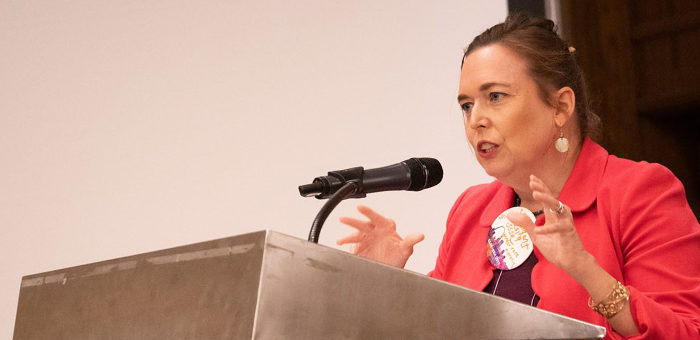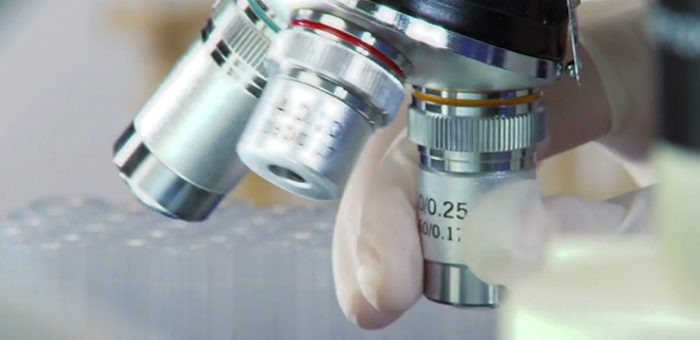Sarah Kropp Brown, NAE vice president of communications and marketing, provides strategic oversight to the organization’s communications, marketing and branding efforts. She also serves as the NAE public relations officer, editor of Evangelicals magazine and producer of Today’s Conversation podcast. She joined the NAE team in 2007, and has served as a board member of the Evangelical Press Association. Kropp Brown graduated with a journalism degree from John Brown University.

And it goes both ways. One in five people in the general public perceive there is hostility by scientists toward religion. Among evangelical scientists, a strong majority (57 percent) perceives hostility from scientists toward religion. There is a sense that scientists have no room for faith, and that evangelicals look to the Bible as their only scientific text.
A Partnership of Evangelicals and Scientists
Evangelicals come from a tradition that believes science and theology cannot contradict one another once rightly figured out. According to St. Augustine (A.D. 354-430), “All truth is God’s truth.” Nearly half of evangelicals — a higher percentage than other religious groups — say that the relationship between faith and science is one of collaboration.
With these tensions in mind, the National Association of Evangelicals teamed up with the largest general science association in the world, the American Association for the Advancement of Science (AAAS), to study, dialogue and resource together.
The NAE consulted on a 10,000-person survey conducted by AAAS partner Rice University on the perceptions of science and people of faith, from which the statistics above come. Findings from the survey were captured on major media outlets from Christianity Today to The Economist.
Conversations for Understanding
One of the survey findings showed that evangelicals are twice as likely as other groups to look to church leaders for answers to their questions about science. This drove the next section of the work together: regional dialogues between faith leaders (including evangelicals) and scientists.
The dialogues did not attempt to build consensus on particular controversial issues, but rather generated discussion on the barriers to opportunities for better dialogue, understanding, and collaboration between evangelicals and scientists.
Glenn Stanton, director of Family Formation Studies at Focus on the Family, attended the regional workshop hosted in Denver.
“As a representative in the faith community, these gatherings have been tremendously beneficial,” he said. Stanton noted the importance of trust as a key factor in communication with scientists and the benefit of connecting with scientists who could talk about science without alienating faith audiences.
Jennifer Wiseman, director of AAAS’s Dialogue on Science, Ethics and Religion, thought there might not be much interest among scientists for participating in dialogues with evangelical leaders.
But she was surprised by the eagerness of influential science leaders, including high-ranking research deans and academic department chairs, to attend. “We even had scientists disappointed, because we didn’t have space to fit them in,” she said.
The most gratifying dialogue moments for her were when participants expressed appreciation for the opportunity to interact with members of the other group.
“This is when I realized that all the public banter about science and religion is a poor substitute for having thoughtful scientists and religious people spending time talking with each other,” Wiseman said.
Some of the scientists were evangelicals, while others expressed, either verbally or nonverbally, discomfort in being in the presence of outspoken Christians.
John Stumbo, president of the Christian and Missionary Alliance, recalled, “One scientist acknowledged to me that he didn’t dare let his associates know what kind of meeting he was attending.”
As Stumbo reflected on the event, he came to several questions about the reputation and behavior of evangelicals:
Why is it that evangelicals are so often viewed as being anti-science?
Why do we as evangelicals pose so many conversations in
“us vs. them” language?
Wouldn’t gracious conversation take us further than combative blasts? A climate scientist — dedicating his life to improve the well-being of the people of this planet — receives “nasty, abusive” emails from professing Christians whenever his work is in the news.
Can’t we reconcile good scientific method with solid evangelical thought? I was saddened to hear one scientist say that “my belief system is separate from my science.”
On the Same Page

In the introduction, Leith Anderson, NAE president, describes the difficulty of engaging in meaningful conversation that respects both faith and science:
As laypersons we sometimes wonder if we know enough about science or religion to ask the right questions of either. As scientists we may welcome serious conversations but wonder if others tilt more toward controversy or more toward truth. As pastors we often keep silent on science, because we don’t know what to say or because we don’t want to engage or escalate unwanted debates.
The resource has attracted immediate interest. Within the first two weeks of the publication’s release, nearly 4,000 copies were downloaded or ordered.
The publication does not answer all the questions, but it unites the conversation in a way that values and respects both science and faith. “When God and Science Meet” is a resource for pastors, churches, schools, scientists and Christians who want to learn more about the intersection of science and faith.
People of science and people of faith have ample opportunities to work together to be an influence for good. We have seen this in medical missions, in technological advances that make the Bible more accessible, in discovery that captures our imagination and awe of the Creator and in wisely caring for creation.
This article originally appeared in Evangelicals magazine.



 View All Articles
View All Articles 









